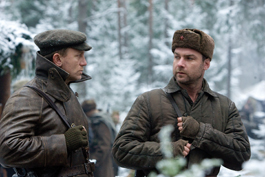home | metro santa cruz index | movies | current reviews | film review

Photograph by Karen Ballard/©2008 by Paramount Vantage
SNOW JOB: Daniel Craig (left) and Liev Schreiber play brothers fighting the Nazis in 'Defiance.'
Fighting Back
Edward Zwick argues that resistance is good for the soul in real-life WWII drama 'Defiance.'
By Richard von Busack
In his biography of John Sturges, film critic Glen Lovell quotes the director's idea that it was odd that only those who saw service in World War II could make good movies about it. This problem worsens the further we get away from that war. Edward Zwick's true-life war movie Defiance sports Daniel Craig on the poster, looking most defiant.
Craig is the fastest draw in the movies today. He has his gun out and discharged by the time most male actors are mulling over the use of deadly force. Certainly Craig looks like he could single-handedly take Hitler downtown. Defiance's photography is not bad: old-world Grimm Brothers woods, shot in Lithuania, looking sometimes ancient, sometimes dawn-fresh; the snow scenes have all due crispness.
But the rest of Defiance wearily insists on the humanistic qualities of a group of partisans fighting for their lives, dividing up the forceful and gentle qualities of such warriors evenly between a pair of Jewish brothers. Ultimately, the film proposes that Craig's Tuvia Bielski was a real-life Moses leading his people to safety.
Defiance starts in August 1941, with the German drive into Russia. A family of Jewish brothers survive the murder of their parents; chief among them are Tuvia (Craig), the smarter one, and Zus (the bull-calf Liev Schreiber), the tougher one. In Belarus' Lipiczanska forest, other refugees join their band. Zus and Tuvia squabble over the approach to fighting off the Germans. As elder brother, Tuvia takes the role of avenger, executing the local officer who bounty-hunted the Bielskis' family for the Germans.
Sickened by the bloodshed, Tuvia decides never again to lower himself to the level of his enemies. Zus, in his grief, pounds his head against a tree; now daubed with a bloody mark of Cain, he leaves and takes up with a Red Army-led band of guerrillas, despite Soviet cruelty and anti-Semitism. The two brothers conduct tension-wracked meetings over the years. Eventually, the two meet in the middle with the resolve to kill the Nazis but kill them respectfully.
Why is Zwick, who exudes humanism like a blintz exudes cream cheese, drawn to war films? The action sequences in Defiance never seem to take off, and the film's climax, a partisan band's attack on a Nazi tank, should have been thrilling. But Zwick's bleeding heart just isn't in it; he's more involved in a re-enactment of The Godfather's famous intercutting between a baptism and a Mafia night of long knives. In Defiance, the two points are a wedding in Tuvia's woods, complete with hora dancing, crosscut with Zus leading a shootout at a German headquarters (done with avant-garde stuttering frames to make it look like stop-motion animation).
Incidentally, this wedding sequence makes lawful what had previously been convenient relationships between the civilians, who took common-law spouses for the duration. They use the phrase "forest husbands." Tuvia demands that the women not produce babies during the woodsy exile, but that order is broken: a rape victim of the Germans tearfully learns to love the life inside her.
Defiance could have been a film in which the humanity of the hunted was implicit. But as we get more distance from this titanic war, we keep getting films that consider the strife was all just good for the soul. Defiance deems the political side of the struggle meaningless. There should be onscreen disclaimers: No endorsement of the USSR is implied in any way!
Zwick keeps including chess matches between a rabbinical schoolteacher and the movie's one left-winger. The intellectual is now getting some good calluses for a change, sawing wood and hammering shelters. The lefty exclaims: "If my friends at the New Socialist Club could see me now! I haven't read a book in months!" The teacher/rabbi (his status is a little vague; he's identified as a teacher but he acts as resident holy man), characterizes the world war as a spat going on between "a man with a little mustache and a man with a big mustache [Stalin, that is]."
The script reminds one of Robert Warshow's comment about E.B. White's equally inane propaganda essays during World War II: "In this humane and yet knowing atmosphere, history and destruction and one's own helplessness become small and simple and somehow peaceful, like life back home on the farm. ... History may kill you, it is true, but you have taken the right attitude."
![]() DEFIANCE (R; 137 min.), directed by Edward Zwick and starring Daniel Craig and Liev Schreiber, opens Friday at the Nickelodeon in Santa Cruz.
DEFIANCE (R; 137 min.), directed by Edward Zwick and starring Daniel Craig and Liev Schreiber, opens Friday at the Nickelodeon in Santa Cruz.
Send a letter to the editor about this story.
|
|
|
|
|
|